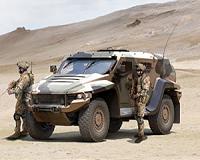| . |  |
. |
Abu Dhabi, United Arab Emirates (UPI) May 28, 2010 The United Arab Emirates is pressing Washington about buying the F-35 Joint Strike Fighter. So is Israel. That's part of the United States' dilemma as it seeks to bolster the military forces of its Arab allies to counter Iran. The Americans also want their Arab friends, particularly the Persian Gulf states that neighbor Iran, to take more responsibility for their own defense at a time when the U.S. military is tied down in Afghanistan and Iraq. The F-35 program headed by Lockheed Martin of Maryland has fallen badly behind schedule. On March 11, the Pentagon admitted to a 2-year lag but industry insiders suspect it's more. The Pentagon estimates that the stealth jet won't be ready for operational deployment until 2015 rather than 2013 as originally envisaged. And the cost has more than doubled from $50 million per aircraft in 2002, when the program was launched, to $113 million -- and the aircraft has barely left the ground. Israel wants the F-35 quickly because it would be ideal for potential airstrikes against Iran's nuclear facilities. No doubt the United Arab Emirates want the state-of-the-art jet for the same reason, to give its already formidable air force a much heftier punch. But whether the F-35 is available any time soon is unlikely to significantly change the accelerating drive by Saudi Arabia, the United Arab Emirates, Kuwait, Qatar and Oman to get their hands on high-end weapons systems to counter Iran's massive manpower and strategic depth. This will focus primarily on air defense and naval power. The former will be to hammer Iran's military, particularly main strategic weapon, its ballistic missile forces; the latter to counter any Iranian attempt to block the Strait of Hormuz. This is the only gateway in and out of the Persian Gulf and through it passes about one-fifth of the world's oil supplies on any given day. Iran has threatened to block the narrow waterway if it is attacked, throttling the gulf states' economies. They worry that Tehran could launch a pre-emptive strike to do that if it felt threatened. The fact that the six member states of the Gulf Cooperation Council, which also includes the tiny island state of Bahrain, are thinking about protecting themselves rather than relying on the Americans, as they have since the 1950s, marks a significant shift in their strategic thinking. The administration of President George W. Bush pledged an arms package worth some $20 billion for the gulf states in 2007 to beef up their capability to counter Iran and that is gradually being delivered. In the aftermath of the 1991 war against Iraq, the gulf states concentrated on upgrading existing defense systems. Now they want access to advanced military technologies. The GCC states are notorious for failing to develop a cohesive common defense strategy that they have discussed since the 1980s. But the Iranian threat could be changing that. U.S. President Barack Obama has been pressing the gulf states to do more for themselves on defense. Fortunately oil sales have kept their coffers full despite the global meltdown. "Since Obama came to power there's been a lot of talk within the administration about burden-sharing," says Mustafa Alani of the Gulf Research Center in Dubai, part of the United Arab Emirates. Defense industry experts say the United Arab Emirates, which has built a military capability that gives it the power to punch well above its weight, will spend around $35 billion over the next 2-3 years. Saudi Arabia, they say, will spend about $50 billion. Tiny Kuwait is expected to focus on missile defenses and fork up $5 billion-$10 billion. In 2009, the U.S. Congress approved the sale to the United Arab Emirates of the Terminal High Altitude Area Defense system. Lockheed Martin is the lead contractor on that project, designed to shoot down short- and medium-range ballistic missiles. Key subcontractors include Raytheon, Boeing, BAE systems and Honeywell. Congress rarely approves the export of such systems to Arab states to ensure Israel's qualitative edge, so that gives some idea of how U.S. thinking has changed. The United Arab Emirates, Saudi Arabia and Kuwait all have Patriot air-defense missile systems built by Raytheon. The United Arab Emirates' purchase was part of a $9.7 billion spending spree on arms in 2008.
Share This Article With Planet Earth
Related Links The Military Industrial Complex at SpaceWar.com Learn about the Superpowers of the 21st Century at SpaceWar.com
 Aussie vehicle makers eye PMV contract
Aussie vehicle makers eye PMV contractCanberra, Australia (UPI) May 28, 2010 The Australian government has awarded three companies $7.5 million each to help them develop prototypes for a next-generation protected mobility vehicle contract of 1,300 units. "Thales Australia, Force Protection Europe and General Dynamics Land Systems Australia are the three companies that will be given a shot at this important contract," said Greg Combet, minister for defense materi ... read more |
|
| The content herein, unless otherwise known to be public domain, are Copyright 1995-2010 - SpaceDaily. AFP and UPI Wire Stories are copyright Agence France-Presse and United Press International. ESA Portal Reports are copyright European Space Agency. All NASA sourced material is public domain. Additional copyrights may apply in whole or part to other bona fide parties. Advertising does not imply endorsement,agreement or approval of any opinions, statements or information provided by SpaceDaily on any Web page published or hosted by SpaceDaily. Privacy Statement |